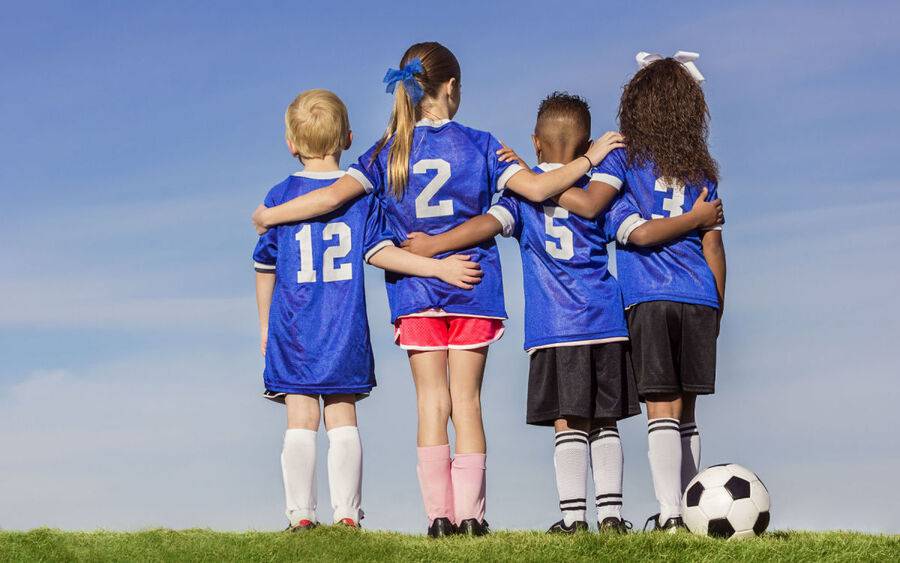Table of Contents
Kids Sports Programs In today’s dynamic world, Kids Sports Programs play a crucial role not just in fostering physical fitness and athletic skills but also in shaping the character and values of young participants. These programs provide invaluable opportunities for children to develop essential life skills, cultivate resilience, and build strong moral foundations that extend far beyond the playing field.

Importance of Kids Sports Programs
Kids Sports Programs serve as incubators for personal growth and character development, offering a structured environment where children learn fundamental principles such as teamwork, discipline, and sportsmanship. Through organized sports activities, young athletes navigate challenges, celebrate achievements, and forge lasting friendships, laying the groundwork for a well-rounded upbringing.
Physical Fitness and Health Benefits
Engaging in Kids Sports Programs promotes physical well-being by encouraging regular exercise and active lifestyles from an early age. Physical activities not only enhance cardiovascular health, muscular strength, and motor skills but also instill habits that contribute to long-term health and wellness throughout life.
Social Skills and Emotional Intelligence
Participation in Kids Sports Programs fosters social skills such as communication, cooperation, and conflict resolution. Team sports, in particular, teach children the importance of collaboration and respect for peers, coaches, and officials. Moreover, navigating wins and losses cultivates emotional resilience and equips young athletes with coping mechanisms to manage setbacks and adversity.
Core Values and Character Development
Sportsmanship and Fair Play
Central to Kids Sports Programs is the emphasis on sportsmanship and fair play. Coaches and mentors instill values of integrity, respect, and ethical behavior, encouraging athletes to compete with honor and dignity. Teaching children to win graciously and lose with grace fosters a sense of humility and respect for opponents, reinforcing positive attitudes both on and off the field.
Leadership and Responsibility
Through leadership roles and team responsibilities, Kids Sports Programs empower children to take initiative, make decisions, and contribute positively to group dynamics. Captains and team leaders learn to inspire their peers, set examples of hard work and dedication, and demonstrate accountability for their actions, nurturing leadership qualities that transcend sports.
Skill Development and Goal Setting
Mastery and Achievement
Kids Sports Programs provide a platform for skill development and mastery, allowing young athletes to hone their abilities through practice, coaching, and competition. Setting and achieving personal and team goals instills a sense of accomplishment and self-confidence, motivating children to strive for excellence in sports and academics alike.
Perseverance and Resilience
Facing challenges and overcoming obstacles are inherent in Kids Sports Programs, teaching children the value of perseverance and resilience. Whether learning a new technique, recovering from a defeat, or overcoming injuries, young athletes develop grit and determination that prepare them to tackle future challenges with optimism and tenacity.
Parental Involvement and Support
Role of Parents and Guardians
Active involvement of parents and guardians in Kids Sports Programs reinforces values taught on the field. Encouraging positive behavior, respecting coaches and officials, and demonstrating sportsmanship during competitions contribute to a supportive and nurturing environment for young athletes. Parents serve as role models, offering guidance and encouragement to foster their child’s growth and enjoyment in sports.
Balancing Expectations and Enjoyment
Maintaining a healthy balance between competitive expectations and enjoyment is crucial in Kids Sports Programs. While striving for success and improvement, it’s equally important to prioritize fun, skill development, and overall well-being. Emphasizing the joy of playing sports instills a lifelong love for physical activity and promotes sustained participation throughout childhood and beyond.
Community and Cultural Impact
Diversity and Inclusivity
Kids Sports Programs embrace diversity and inclusivity, welcoming participants from various backgrounds, abilities, and interests. Celebrating cultural differences and promoting equity in access to sports opportunities enriches the program experience, fostering mutual respect and understanding among young athletes.
Community Engagement and Support
Engaging with local communities and forging partnerships with schools, recreation centers, and youth organizations amplify the impact of Kids Sports Programs. Collaborative efforts ensure access to facilities, coaching expertise, and resources that enhance program quality and expand outreach to underserved populations, promoting broader participation and positive community outcomes.
Challenges and Solutions
Addressing Barriers to Participation
Overcoming barriers such as financial constraints, transportation limitations, and lack of access to sports equipment requires proactive solutions and community support. Scholarships, subsidized programs, and volunteer initiatives play pivotal roles in ensuring inclusivity and equitable opportunities for all children interested in joining Kids Sports Programs.
Ensuring Safety and Well-being
Prioritizing the safety and well-being of participants is paramount in Kids Sports Programs. Coaches, administrators, and parents collaborate to implement health protocols, injury prevention measures, and emergency preparedness strategies to safeguard young athletes during practices, games, and competitions.
Future Directions and Innovation
Technological Integration
The future of Kids Sports Programs is shaped by advancements in technology, including virtual coaching tools, performance analytics, and interactive training platforms. These innovations enhance coaching effectiveness, track player development, and offer personalized training experiences that cater to individual needs and abilities.
Holistic Approach to Development
Embracing a holistic approach to child development, Kids Sports Programs integrate mental skills training, nutritional education, and wellness practices into their curriculum. By nurturing the whole child—physically, emotionally, and socially—these programs prepare young athletes to excel not only in sports but also in academics, careers, and life pursuits.
Kids Sports Programs
In conclusion, Kids Sports Programs serve as transformative experiences that go beyond athletic achievements to cultivate essential character traits and life skills in young participants. From promoting physical fitness and social-emotional growth to instilling values of sportsmanship and resilience, these programs play a pivotal role in shaping confident, well-rounded individuals. As Kids Sports Programs evolve to meet the needs of future generations, they uphold the commitment to fostering a positive youth sports culture where every child has the opportunity to thrive, learn, and succeed on their journey through sports and beyond.

More Stories
Unveiling Excellence: The Techniques Taught at the Premier Swimming School
The Journey from Basketball School to Pro: Unveiling the Pathway
The Biggest Moments in College Sports History